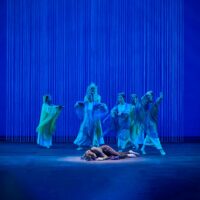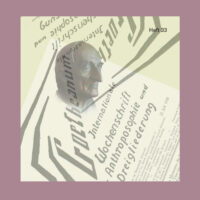After cancellations due to COVID in 2020 and 2021, the conference of the International Network of Academic Steiner Teacher Education (INASTE) ‹Realizing Humanity› could finally take place, in the beautiful month of May and in the beautiful city of Vienna. 150 participants from Germany, Scandinavia, Austria, and the Netherlands came together seeking perspectives on education.
This was the fourth INASTE conference in which professors, lecturers and students related to Waldorf education and other academic institutions met to exchange views. The conference took place in the rooms of the renowned Diplomatic Academy in Vienna.
The organizers had defined four main themes: ‹Learning and living in cultural plurality and identity›, ‹Development in difference and community’, ‹School between virtuality and humanity› and ‹Development towards responsibility for human beings and nature›. Presentations on each topic were held followed by an exchange of views in discussions. Discussion forums and keynote presentations added to the conference.
Constanza Kaliks, head of the Pedagogical Section, was up first. She offered a wide range of humanistic aspects, bringing together fundamental ideas of Waldorf education with leading thoughts from philosopher Emmanuel Levinas, Brazilian educator Paulo Freire, and Argentine philosopher Enrique Dussel. This created an inspiring image of humanity from multiple aspects that is essential and fundamental to future pedagogy.
Jens Beljan from the University of Jena spoke about ‹Resonance Pedagogy: Impulses for the Promotion of Humanity, Responsibility and Solidarity›. Based on his explanations of the pedagogical relevance of central concepts of sociologist Hartmut Rosa’s resonance theory – being affected (being moved), self-efficacy, unavailability, and transformation – a vision of pedagogy emerged in which the development and transformation of students through bodily/mental resonance experiences was central. These thoughts were understandable to the audience familiar with Waldorf, although they were developed from other perspectives and backgrounds. It was fascinating to observe how, from very different points of view, many commonalities with the goals of Waldorf education emerged. In this way, the conference was characterized by an appreciation of the positions of all contributors in the common search for what is right for children and human beings.
The third presentation was given by Ida Oberman from the Community School for Creative Education in Oakland, USA. Under her management, the school has since become an important pillar in the worldwide development of Waldorf education. In one of the most underprivileged neighborhoods of one of the poorest cities in California, the Waldorf Charter School has become a kind of ‹oasis of being and learning› for hundreds of children. The success of this model is also recognized by state officials, as the schools’ scores and successes on tests continuously administered by the city and state indicate significant and exceptional learning progress.
Larissa Beckel, who works at the Alanus University in Mannheim, reported on her doctoral thesis on the experiences of migrants at German Waldorf schools. Her study documents the challenges faced by young people with a migrant background in Germany and draws valuable insights and approaches for Waldorf education from this.
The last speaker was Henning Schluß from the University of Vienna, whose exceptional biography had already aroused great interest. He was a conscientious objector in the GDR, then worked as a mechanical engineer for the railroad, and ultimately became a professor of Protestant theology and education. He spoke about ‹Responsibility for the Future – Challenges of Climate Change for Pedagogy›. The magnitude of this responsibility and the urgency of our actions were vividly portrayed by him based on data and pedagogical implications.
As a special feature, the conference held a musical world premiere in store for the participants: a work commissioned by the Center for Culture and Pedagogy in Vienna on the occasion of its 20th anniversary was performed by a four-piece ensemble. The composition ‹La Porte› by Maria Gstättner is based on a moving piece written by Simone Weil.
Translation Simone Stadlbacher
Photo Center for Culture and Pedagogy
Peter Lutzker Worked as an orchestral musician in various German orchestras. Upper school teacher for English and music at various Waldorf schools. Since 2010 professor at the Freie Hochschule Stuttgart. Main research interests: Theater in the art of teacher education, theater in foreign language teaching. Literature and creative writing in foreign language teaching, sensory theory and sensory development. Publications: among others ‘Der Sprachsinn’, ‘Fremdsprachenunterricht an der Waldorfschule’.













